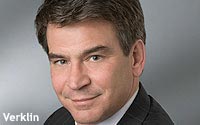 NEW ORLEANS -- Adland’s senior media executives took center stage at the 4As Conference Tuesday morning to grapple with some of the
industry’s thorniest issues and some pointed questions from moderator and media agency veteran David Verklin, now operating partner at Calera Capital.
NEW ORLEANS -- Adland’s senior media executives took center stage at the 4As Conference Tuesday morning to grapple with some of the
industry’s thorniest issues and some pointed questions from moderator and media agency veteran David Verklin, now operating partner at Calera Capital.
After a warm-up question or two,
Verklin observed that all of the panelists were white males -- a comment on the lack of diversity in the industry. “Why?,” he asked.
After 15 seconds or so of somewhat awkward
silence, Verklin was about to move on when GroupM Global CEO Irwin Gotlieb replied that one of the company’s media agencies, Maxus, had recently named an Indian (Vikram Sakhuja) to the post of
global CEO. And he is based in India. It wasn’t a move made for diversity’s sake, said Gotlieb. “He’s talented,” he added, asserting that the days when the industry was
ruled solely by white males “are over."
advertisement
advertisement
But big talent issues remain -- particularly at the entry level, said Horizon Media CEO Bill Koenigsberg. “The industry is on thin ice in
terms of new people,” he said, submitting that the turnover rate among those in the business for two years or less is between 30% and 40%.
Part of the problem, said Koenigsberg, is low
entry-level salaries -- which has to change.
Another problem, said Gotlieb, is that the industry has recruited too heavily from communications schools, which often don’t provide enough
training in the quantitative sciences required for many openings. “We’ve done a terrible job on this,” said Gotlieb.
But the homogeneous talent pool is just part of the issue
said Matt Seiler, CEO of Mediabrands, the media oversight arm of Interpublic Group. The offerings of the major shops are also too much alike. “The fact that we all look the same is the
problem,” he said. Mediabrands is working hard at becoming a content and pay-for-performance-focused company, he added, noting that he hopes others will try to differentiate in other ways.
Verklin asked Nigel Morris, CEO, Aegis Media Americas and EMEA, if last year’s General Motors global account win by flagship
agency Carat signals a sea change in the way media agencies will serve clients in the future or whether the win was based primarily on “fee negotiation.”
“We’ve
made dramatic changes with GM,” replied Morris. The transition, he said, was “not easy,” no surprise given the business was consolidated globally from about 50 agencies to a single
shop. But the win does signal the future direction of media agency business, Morris added. “We’re driving innovation around convergence."
Verklin set the panel up next by asking
them if they all agreed that “client business comes first.” Once they did, he asked: "How can a trading desk be fair to clients,” when that approach often hides precisely how much an
agency is paying for specific ads for individual marketers.
GroupM’s Gotlieb responded that “it doesn’t say in Genesis that everything has to be fully disclosed.” The
ultimate goal is achieving the pricing pledged to individual clients. Just as sellers accrue loads of data “for the benefit of yield management,” GroupM has to “build data structures
and technology platforms to go toe to toe” with them in order to achieve price objectives.
Klues said that the industry needs to identify other models of remuneration, given the focus
that clients put on procurement. Otherwise, “we’re going to get squeezed,” he said.
OMD CEO Alan Cohen said he sees media agencies focused on “two buckets” within
the next five years, including units that focus on “big ideas” and consultancy-type offerings with the other side devoted to “programmatic buying."
Verklin noted that sellers
often complain they can’t get anywhere at big media shops when they want to pitch new and interesting ideas. “We’re complicated,” acknowledged Seiler. His suggestion to the
sales community: “you need to be better at developing client-oriented ideas” that help drive business growth.
Cohen replied that OMD has several groups, like Ignition, that are
designed to foster innovative ideas that vendors could try pitching.